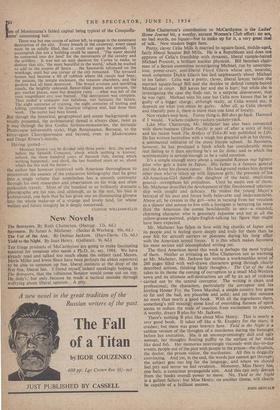New Novels
The Betrayers. By Ruth Chatterton. (Harrap. 12s. 6d.)
THE fringe products of McCarthyism are going to make fascinating tnaterial for someone who needs a Ph.D. in, say, 1984. We have already read and talked too muds about the subject (and Messrs. Merle Miller and Irwin Shaw have been perhaps the ablest reporters) to be able to summon up fine, liberal instincts at the drop• of the first fine, liberal hat. I found myself indeed sneakingly hoping, in The Betrayers, that the villainous Senator would come out on top. He didn't; but only because he made a tactical mistake through worrying about liberal opinion. A pity. Miss Chatterton's contribution to McCarthyana is the Ladle.? Home Journal bit, a worthy, earnest Women's Club effort: no sex, no bad words, no liquor—but to make up for it, a very great deal of talk. New readers begin here.
Pretty, clever Celia Mills h married to square-faced, middle-aged, fairly liberal Senator Bill Mills. He is a Republican and does not approve of Celia's friendship with dynamic, liberal rumple-haired Michael Prescott, a brilliant nuclear physicist. Bill becomes chair- man of a Senate committee investigating Michael, run by unscrupu- lous, power-crazy, anti-liberal Floyd Glavis whose son, neurotic, weak columnist Dickie Glavis has lied unpleasantly about Michael to his father. Celia was a pretty, clever, liberal lawyer before she married square-facc,d Bill and she decides to defend rumple-haired Michael in court. Bill leaves her and she is hurt; but while she is investigating the case she finds out, in a surprise denouement, that he was right. Michael wins his case but Celia now knows that he is guilty of a bigger charge; although really, as Celia would say, it depends on what you mean by guilty. After all, as Celia cleverly and liberally puts it, there is more than one kind of loyalty.
New readers stop here. Funny thing is, Bill does go back. Damned if I would. Yackety-yackety-yackety-yackety-yack.
Like Miss Chatterton, Mr. Michener has also been connected with show-business (South Pacific is sort of after a story of his); and his recent book The Bridge4 of Toko-Ri was published in Life. He has written heretofore with a tough but graceful sob in his throat, a sentimental militarist of the more literate school. In Sayonara, however, he has produced a book which has considerably more real feeling to it than anything he's so far done; and in which the sentimentality is serious enough to be a valid emotion.
It's a simple enough story about a successful Korean war fighter- pilot who gets a leave in Japan. His father is a famous general and the Army his chosen career. His background makes him despise other men who've taken up with Japanese girls; the presence of his All-American-Girl fiancee—the daughter of the local, small-time general—strengthens his prejudices. Until he meets one of them. Mr. Michener describes the development of this foredoomed relation- ship with insight and delicacy. He makes the young Major's betrayal of his past and future both believable and understandable. Above all, he creates in the girl—who in turning from her vocation as a dancer and actress to live with a foreigner is betraying far more than the American (he comes bewilderedly to see)—a rounded, charming character who is genuinely Japanese and not at all the yellow-grease-painted, pidgin-English-talking lay figure that might have been expected.
Mr. Michener has fallen in love' with big chunks of Japan and its people and is feeling more deeply. and truly for them than he ever felt for aircraft carriers or platoons during his long affair with the American armed forces. It is this which makes Sayonara his most serious and accomplished writing yet.
The third American novel this week is perhaps the most typical of them. Neither as irritating as Miss Chatterton nor as warming as Mr. Michener, Mr. Jackson has written a workmanlike novel of 260 pages filled with well-drawn characters going through clearly described actions, thinking likely thoughts.- The Cut of the Axe takes as its theme the coming of corruption to a small Mid-Western town and its ultimate self-destruction set off by an act of violence - carried out by the central corruptor. The writing is clean and professional; the characters, particularly the corruptor and his hireling Homer Fry, the Town Marshal, a simple country boy gone .to fat and the bad, are plausible and solid; and yet this remains no more than nearly a good book. With all the ingredients there, something's still missing; some kind of overriding flatness of spirit seems to reduce th scale of reaction from excitement to respect. A worthy, dreary B Plus for Mr. Jackson.
There's nothing B plus like about Miss Henry. This is nearly a very good book. It takes off like a St. Exupery for the stars; it crashes; but there was great bravery here. Yield to the Night is a cablese version of the thoughts of a murderess during the fortnight before her execution. She is an uncompromisingly dull and ugly woman, her thoughts floating puffily to the surface of her mind like dead fish. Her memories intermingle viscously with day-to-day events, people out of the past with people in the prison—the chaplain, the doctor, the prison visitor, the wardresses. All this is doggedly convincing. And yet, in the end, the words just cannot get through; the subject gets too big for the language; and where we should , feel pity and terror we feel revulsion.. Moreover, Miss Henry has, one feels, a conscious propaganda aim. And this can only detract from the books overall power to move. No, Yield to the Night is a gallant failure; but Miss Henry, on another theme, will 'clearly be capable of a brilliant success. . ,
JOHN METCALF,


































 Previous page
Previous page